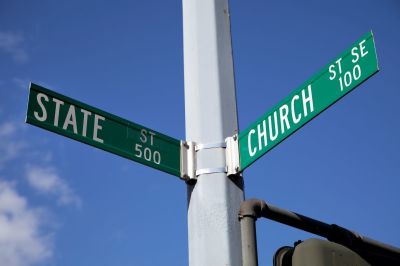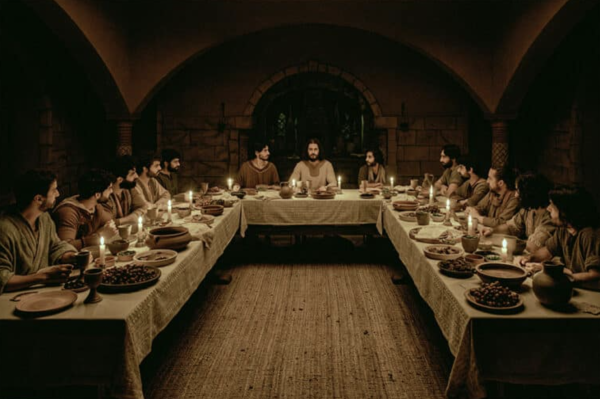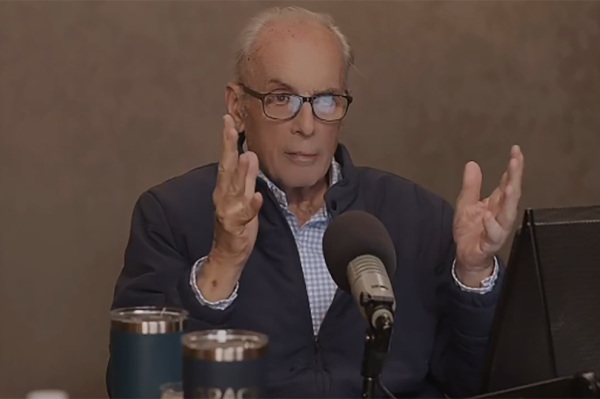What is the proper balance between church and state?
There are few more important or controversial issues in American culture about which there is as much confusion as the issue of the role religion should, or should not, play in our society. For example, Rep. Lauren Boebert, R-Colo., has recently declared:
“The Church is supposed to direct the government. The government is not to direct the Church. That is not how our Founding Fathers intended it.”

Congresswoman Boebert clearly rejects the concept of separation of church and state. Many Americans agree with Rep. Boebert, and many don’t.
Perhaps the best thing to do is to make sure what we mean by separation of church and state, and what Thomas Jefferson meant by it when he supposedly originally coined the phrase “separation of church and state” in a letter to the Baptist ministers of Danbury, Connecticut, who were experiencing religious persecution from the state-established church (Congregational) in Connecticut.
Thomas Jefferson had been an eloquent defender of freedom of conscience, doing legal battles with the established church (Episcopal) in Virginia even before the ratification of the U.S. Constitution and the subsequent adoption of the Bill of Rights (The first 10 Amendments to the Constitution).
The First Amendment to the Constitution declared, “Congress shall make no law respecting an establishment of religion, or prohibiting the free exercise thereof: or abridging the freedom of the press, or the right of the people peaceably to assemble, and to petition the Government for a redress of grievances.”
Unfortunately, the First Amendment only applied to the federal government, not the individual states. Consequently, nine of the original 13 states retained their established, state churches which granted privileged, tax-supported status to the established church, while discriminating against, and often persecuting, members of dissenting religious fellowships, including Baptists, Roman Catholics and Quakers.
The Baptists of Danbury, Connecticut, sent a letter to the newly elected President Jefferson in 1801 expressing their grave concerns about their state’s constitutions, which granted “mere toleration,” rather than religious freedom, to minority faith adherents such as themselves:
“Religion is at all times and places a matter between God and individuals—That no man ought to suffer…on account of his religious Opinions—That the legitimate Power of civil government extends no further than to punish the man who works ill to his neighbor.”
In his now-famous response, President Jefferson declared:
“Believing with you that religion is a matter which lies solely between Man and his God, that he owes account to none other for his faith or his worship, that the legitimate powers of government reach actions only, & not opinions. I contemplate with sovereign reverence that act of the whole American people which declared that their legislature should ‘make no law respecting an establishment of religion, or prohibiting the free exercise thereof’ thus building a wall of separation between Church & State.”
Jefferson’s letter to the Connecticut Baptists was a carefully worded “position paper” which was circulated to his cabinet and closest advisors and went through three drafts before the final form was sent to the Connecticut Baptists.
It has been suggested by some, including myself, that Jefferson meant literally a wall of separation between the institution of the church and the institution of the state — not the separation of religiously informed morality and public policy.
One evidence that this is the correct interpretation of Jefferson’s statement is that he sent this letter on a Friday. The following Sunday, less than 48 hours later, Jefferson attended a Christian worship service being held in the House of Representatives with his friend John Leland, the most prominent Baptist leader in the early Federal Period, preaching the sermon from the Speaker’s rostrum. This is hardly the act of a man who advocated the strict separation of religion from public policy and public life.
Second, when one looks at the actual language of the First Amendment that Jefferson looks upon with “sovereign reverence,” one cannot fail to perceive that all the restrictions are on the government, not religious citizens. An individual citizen cannot violate the “establishment clause,” or the “free exercise clause,” only the government can.
In fact, this concept of separation of government from the church can be traced back to one of the first Baptists in the New World, Roger Williams. Back in the early 17th century, Williams argued that the wall of separation between church and state was necessary to protect the garden of the church from the encroachment of the world.
Starting in about 1740, America experienced its First Great Religious Awakening, which had a profound impact on the nation as a whole and turned the South from the least religious part of the country to being the most religious in terms of church membership growth.
This was followed by the Second Great Awakening beginning in around 1800 and which resulted in the widespread evangelization of the frontier. One major result of these religious movements is that Baptists (closely followed by Methodists) became the largest religious group in America (until they were overwhelmed by the large-scale Roman Catholic immigration to America beginning in the 1830s and continuing through the end of the 19th century).
These developments meant the early demise of the established churches in the individual states (the last two states to disestablish were Connecticut in 1818 and Massachusetts in 1833).
Beginning in the mid-20th century a concerted effort began by the ACLU and others to declare that the restrictions of the First Amendment were meant to circumscribe what Christians and churches could do rather than limiting government.
So, what should the balance be? Too often the debate is seen as one between the “avoidance” position and the “acknowledgment” position when it comes to religious convictions being applied to the nation’s public policy and culture. The “avoidance” position frowns upon religious views playing a role in public life and avoiding expressions of faith in governmental spaces (schools, public events, Congress, state houses, etc.). The “acknowledgment” position seeks government acknowledgment “for, on behalf of the people” in the same public spaces the avoidance position wants to purge religious expression.
These two positions are almost totally mutually exclusive. I have proposed a third position, the “accommodation” position, which would seek government “accommodation” of an individual’s rights to express religious beliefs according to the dictates of his or her own conscience in the public square and public and government spaces. The “accommodation” position would have the government playing the role of “umpire,” not “coach” or “sponsor.” In other words, in the “accommodation” position, the government just makes sure everyone “plays fair,” and that no person or group monopolizes the conversation or attempts to silence anyone else.
Perhaps the most complete explanation of the “accommodation” position is found in the official, convention-approved confessional statement (The Baptist Faith & Message), of the Southern Baptist Convention, the nation’s largest Protestant denomination.
In Article XVII on “Religious Liberty,” the confession declares that “God alone is Lord of the conscience.” It then states quite unequivocally:
“Church and state should be separate. The state owes to every church protection and full freedom in the pursuit of its spiritual ends….no ecclesiastical group or denomination should be favored by the state more than others….The church should not resort to the civil power to carry on its work….A free church in a free state is the Christian ideal, and this implies the right of free and unhindered access to God on the part of all men, and the right to form and propagate opinions in the sphere of religion without interference by the civil power.”
One cannot help but hear the echoes of the language employed by the Connecticut Baptists and Jefferson in the confession’s language.
The Baptist Faith & Message’s Article XV on “The Christian and the Social Order” is the “other side of the coin” so to speak in comparison to the Religious Liberty article. It begins:
“All Christians are under obligation to seek to make the will of Christ supreme in our own lives and in human society….In the spirit of Christ, Christians should oppose racism, every form of greed, selfishness, and vice and all forms of sexual immorality, adultery, homosexuality, and pornography. We should work to provide for the orphaned, the needy, the abused, the aged, the helpless, and the sick. We should speak on behalf of the unborn and contend for the sanctity of all human life from conception to natural death. Every Christian should seek to bring industry, government, and society as a whole under the sway of the principles of righteousness, truth, and brotherly love.”
In other words, as Christians we have a responsibility to be involved in public policy as salt and light, seeking to bring America ever more under the “sway” of Gospel principles, with the population voluntarily practicing such principles, without coercion.
The Baptist way is to guarantee everyone's “soul freedom” to follow their God as they understand He should be followed unless, and until, they seek to coerce their fellow citizens, which would violate their fellow citizens’ religious freedom.
If Americans followed the pre-1945 understanding of the First Amendment, they would have much more religious freedom than they do today and they would have far more freedom to promulgate their views without the threats of the censorious “cancel culture.”
I believe a careful study of these two articles would “flesh out” the definition of the “accommodation” model which would lead to a much freer and harmonious society.
*In the interest of full disclosure, Dr. Land served on the committee that revised the Baptist Faith & Message that was overwhelmingly approved by the convention that was in Orlando, Florida, in June 2000.
Dr. Richard Land, BA (Princeton, magna cum laude); D.Phil. (Oxford); Th.M (New Orleans Seminary). Dr. Land served as President of Southern Evangelical Seminary from July 2013 until July 2021. Upon his retirement, he was honored as President Emeritus and he continues to serve as an Adjunct Professor of Theology & Ethics. Dr. Land previously served as President of the Southern Baptist Convention's Ethics & Religious Liberty Commission (1988-2013) where he was also honored as President Emeritus upon his retirement. Dr. Land has also served as an Executive Editor and columnist for The Christian Post since 2011.
Dr. Land explores many timely and critical topics in his daily radio feature, “Bringing Every Thought Captive,” and in his weekly column for CP.






















